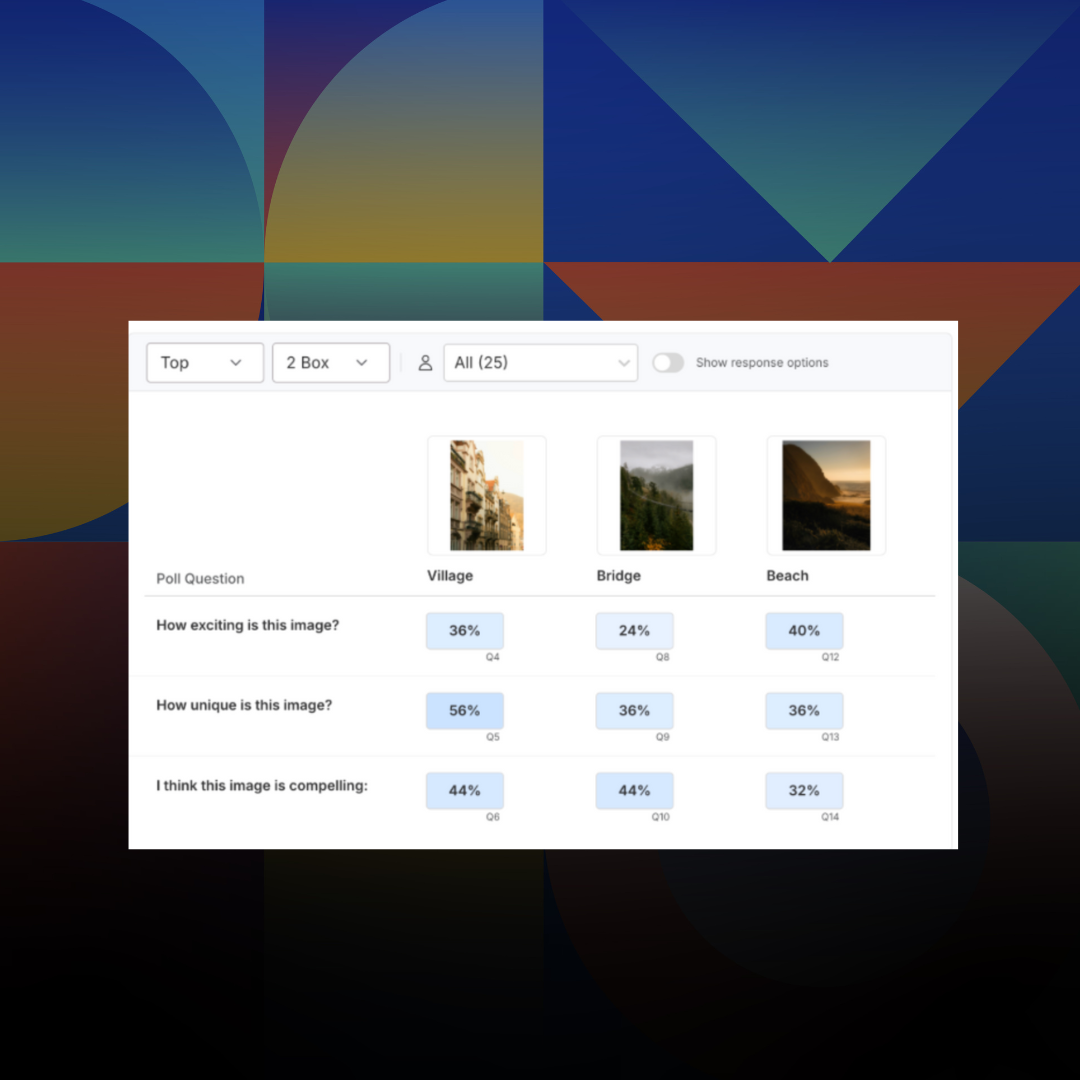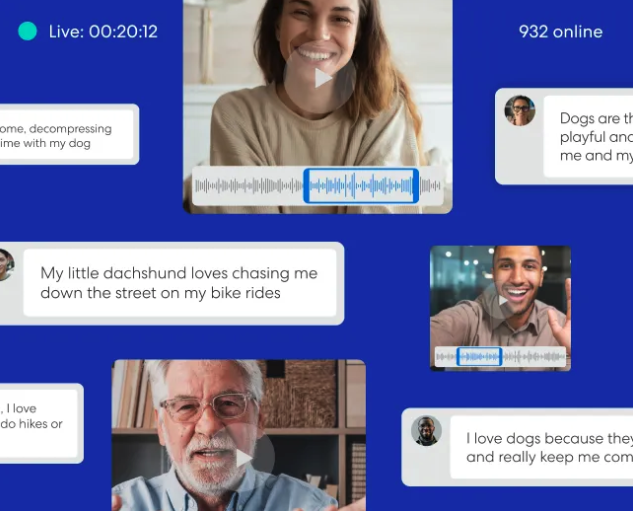
Research 101
Introducing: Poll Comparison - Streamline Concept Testing and Make Better Decisions Faster
Emmet Hennessy
November 24, 2025
Market Research
Articles

Research 101
Introducing: Poll Comparison - Streamline Concept Testing and Make Better Decisions Faster
Emmet Hennessy
November 24, 2025
Market Research
Articles

AI
Purpose-Built for Research AI is Here - a Letter from the CPO
Jessica Dubin
October 21, 2025
Market Research
Articles

AI
Purpose-Built for Research AI is Here - a Letter from the CPO
Jessica Dubin
October 21, 2025
Market Research
Articles

Advanced Research
Unlock Agile Global Insights: Using Remesh Multi-Language Conversations for Research Across Audiences
Customer Success Team
October 14, 2025
Market Research
Articles

Advanced Research
Unlock Agile Global Insights: Using Remesh Multi-Language Conversations for Research Across Audiences
Customer Success Team
October 14, 2025
Market Research
Articles

AI
The Prompt Is the New Moderator Guide
Anthony Lam
September 16, 2025
Market Research
Articles

AI
The Prompt Is the New Moderator Guide
Anthony Lam
September 16, 2025
Market Research
Articles

AI
Building an AI-Ready Research Stack: Beyond Data Preparation
Anthony Lam
September 9, 2025
Market Research
Articles

AI
Building an AI-Ready Research Stack: Beyond Data Preparation
Anthony Lam
September 9, 2025
Market Research
Articles

AI
Agentic AI for Research: A Practical Primer
Dan Reich
September 2, 2025
Market Research
Articles

AI
Agentic AI for Research: A Practical Primer
Dan Reich
September 2, 2025
Market Research
Articles

Advanced Research
Webinar Recap: Unlocking Depth at Scale - Remesh Video for Researchers
Customer Success Team
August 5, 2025
Market Research
Webinars

Advanced Research
Webinar Recap: Unlocking Depth at Scale - Remesh Video for Researchers
Customer Success Team
August 5, 2025
Market Research
Webinars

Transparency in AI: How Remesh Builds Trust Through Responsible Implementation
Ross Coudeyras
July 21, 2025
Articles

Transparency in AI: How Remesh Builds Trust Through Responsible Implementation
Ross Coudeyras
July 21, 2025
Articles

Advanced Research
Webinar Recap: Turning Employee Engagement Insights into Action with Remesh
Customer Success Team
June 16, 2025
Employee Research
Articles

Advanced Research
Webinar Recap: Turning Employee Engagement Insights into Action with Remesh
Customer Success Team
June 16, 2025
Employee Research
Articles
5 Common Mistakes When Designing Customer Feedback Surveys
Customer feedback surveys are the best way to get inside your customer's mind. Avoid these 5 common mistakes when developing customer survey questions.



Taking customer feedback surveys - and crafting them - can be a drag for you and your customers. By avoiding this list of common mistakes, it’s easy to avoid skewing data with poorly written questions and to ensure you’re taking the time to craft well-thought-out, unbiased questions
Just as Eminem says, “You only get one shot, do not miss your chance,” it’s vital that you not miss your chance for insightful, clean data from your customers. Making business decisions off of biased customer data can lead to costly mistakes.
1. Using Leading Questions
When designing your customer feedback survey, you want nothing but the cold, hard truth. So when a question is leading, it is often unintentional - it can be hard to write unbiased questions when you already have a preferred outcome in mind.
Be careful of the words you include in the questions - you might have words that have a more positive or negative connotation, thus already biasing your customer’s mindset when answering. Leading questions have a way of putting your answer right in your customer’s mouth.
For example:
- BAD QUESTION: How has Brand Co. excelled compared to agencies you’ve used in the past?
- GOOD QUESTION: How does Brand Co. compare to agencies you’ve used in the past?
2. Asking Double-Barreled Questions
This one happens so often that there’s actually a name for it: a double-barreled question. This is when you are actually asking two questions in a way that sounds like you’re only asking one. Your audience may have different thoughts about the two things you’re asking about but instead, you’re forcing them to give a single answer that covers both.
For example:
- BAD QUESTION: Not the way to do it: How would you rate the speed and quality of customer service that you’ve received in the past 30 days?
- GOOD QUESTION (1): How would you rate the speed of customer service that you’ve received in the past 30 days?
- GOOD QUESTION (2): How would you rate the quality of customer service that you’ve received in the past 30 days?
3. Using Branded Language or Jargon
Sometimes, when you’re at work, writing an email or in a meeting, you start saying things like “synergy” and “paradigm shifts” despite your best judgment (it happens to us all). While corporate-speak can allow you to fit in with your colleagues, it will only distance you from your respondents.
When you ask questions on your online customer surveys that include this type of jargon, expect to get responses that are equally vague and formalized. Your customers are people too so do them a favor and speak to them like it. They’ll appreciate it.
For example:
- BAD QUESTION: What do you feel is Brand Co.’s core competency?
- GOOD QUESTION: What do you feel is Brand Co.’s biggest strength?
4. Asking Overly Complex Questions
This ties into the previous point about corporate-speak - simplest is best. You need to be clear, concise, and to the point. Unnecessary complexity distorts your questions’ meaning and can lead to non-responses or responses that don’t truly represent your customer because they misunderstood you in the first place. Making sure there are a few mental hurdles as possible will lead to faster, clearer answers.
For example:
- BAD QUESTION: What was your level of satisfaction of Brand Co.’s closed-loop feedback process for your project?
- GOOD QUESTION: How did you feel Brand Co. did at implementing your project feedback?
5. Asking Too Many Questions
The human attention span is shorter than a Goldfish's (no lie). You are lucky to have captured your customer’s attention long enough for them to open the email about your survey, let alone invest their time to respond to it.
When surveys are drawn out and are too long or too complicated, respondents tend to skip questions or abandon the whole survey in the first place.
Some ideas to consider:
- Take your customers’ time into account. Select only the questions that will give you the most crucial insight.
- Understand how invested your customer is in answering - are they being incentivized? Are they brand evangelists?
- Reconsider the amount of effort each question demands. We recommend crafting a customer feedback survey that can be completed in around 5 minutes.
Summing Up Common Survey Mistakes
While it may seem like common sense to avoid these customer feedback survey mistakes, they are incredibly easy to make when you don’t think carefully and critically about each question. Make sure you have several different eyes on each customer feedback survey you craft- it will also help you catch and remove bias before it’s too late.
-
Lorem ipsum dolor sit amet, consectetur adipiscing elit. Suspendisse varius enim in eros elementum tristique. Duis cursus, mi quis viverra ornare, eros dolor interdum nulla, ut commodo diam libero vitae erat. Aenean faucibus nibh et justo cursus id rutrum lorem imperdiet. Nunc ut sem vitae risus tristique posuere.
-
Lorem ipsum dolor sit amet, consectetur adipiscing elit. Suspendisse varius enim in eros elementum tristique. Duis cursus, mi quis viverra ornare, eros dolor interdum nulla, ut commodo diam libero vitae erat. Aenean faucibus nibh et justo cursus id rutrum lorem imperdiet. Nunc ut sem vitae risus tristique posuere.
-
More

Introducing: Poll Comparison - Streamline Concept Testing and Make Better Decisions Faster

.png)

.png)
Read More

.png)
.png)
.png)

.png)

.png)
Learn More

.png)
.png)
.png)


Unlock Agile Global Insights: Using Remesh Multi-Language Conversations for Research Across Audiences

.png)

.png)
Read More

.png)
.png)
.png)

.png)

.png)
Learn More

.png)
.png)
.png)
Stay up-to date.
Stay ahead of the curve. Get it all. Or get what suits you. Our 101 material is great if you’re used to working with an agency. Are you a seasoned pro? Sign up to receive just our advanced materials.




